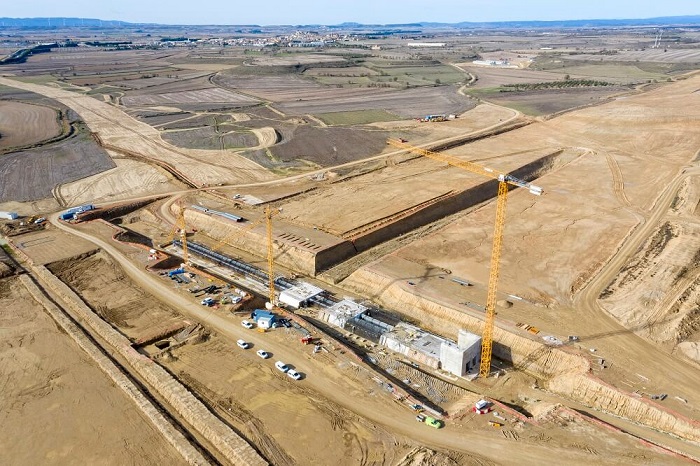Over the past two decades, the consumption of aggregates in the world has tripled. The exploitation of resources like sand and gravel, has negative effects on the ecosystem. And the extraction of these materials is starting to be a global problem that is affecting seas and rivers.
For this reason, at Sacyr we promote circularity and look for solutions that involve reducing consumption and using alternative, recycled materials to replace natural sand, among others.
We reuse materials like as soil, we use sustainable resources such as recycled steel and renewable resources such as wood with sustainable certification.
In 2022, the consumption of recycled materials was 50.48% of the total material consumed by our company and 86.6% of waste was reused, recycled and recovered.
Last year, we reduced the consumption of steel, the use of aggregates, the use of concrete, wood and paper (figures in the 2022 Integrated Sustainability Report).
We promote the reuse of excavation lands in the construction site itself in all construction projects. This favors energy savings, a reduction in emissions and a decrease in costs, extending the life cycle of the products.
Constructions with recycled materials
At the Almudévar Reservoir JV (Spain), part of the land of the loose material left over from building the dams has been reused for the modeling of the reservoir vessel. With this action, we prevented the generation of 84,554.48 tons of waste.
The Alhandroal railway project (Portugal), which is being delivered by Sacyr Somague, collaborates with the Portuguese government to recover the landscape in an area with multiple marble mining prospections. For its recovery, leftover materials from the excavation of the demons of the work is being used (earth excavation that is carried out in an environment with the aim of lowering the grade to reduce its height and thus achieve a perfect plane on which to support and execute a work or building).
In the construction project of the Plaza Europa 34 Tower in Barcelona (Spain), office building, which aims to obtain the LEED GOLD sustainable certification, a wide variety of materials with a high content of recycled materials are being incorporated, some of them even reaching 100%.
Construction waste recovery
At Sacyr, we prioritize reusing soil and recovery of construction and demolition waste (CDR's).
In 2022, 6,645,418.14 tons of soil from earthworks have been reused in the works themselves, which represents 78.77% of the total excavated material. This represents a 28.52% increase compared to 2021.
We analyzed the main non-recoverable waste streams at two building projects in Barcelona (Spain) Plaza Europa Tower 34 and Badajoz Building 97, , taking into account the recovery possibilities offered by manufacturers today. To do this, we focused on two materials: plasterboard plates used in dry partitions and false ceilings, and rock wool insulation installed in partitions, false ceilings and facades, which have been sent to different manufacturers for reuse.
Chile, a case study
In Chile, we put out measures for the valorization of waste in our projects that have been recognized in the publication of the Official Spanish Chamber of Commerce of Chile, “103 Spanish investment initiatives to contribute to the development of Chile”.
In the construction of Villarrica Hospital, located in the south of Chile, we avoided more than 9,200 tons of landfill-bound waste.
In the execution of the Alto Hospicio Hospital about 3,750 tons of the clearing material (earth and rocks) have been reused for the construction of a platform for a public space in the same town.
Alto Hospicio Hospital (Chile)
In the Ruta Nogales-Puchuncaví, green circuits such as waste recycling and water recovery were installed with a treatment plant, which is reused to water plants in plant nurseries. Thanks to this, more than 99% of the waste has been recovered.
In 2022, 1,057,846.18 tons of earthworks have been removed, which is 12.54% of the total excavated material. This is a notable decrease compared to the 2021 data, which was 17.01%.
Minimizing hazardous waste
One of the lines of action of Sacyr is directed to minimize the generation of waste, hazardous and non-hazardous, in their different activities.
For this reason, Sacyr Engineering and Infrastructure is committed to modular construction to reduce hazardous and non-hazardous waste, also optimizing the use of resources.
An example of this is the Fractal residential complex building project where we incorporated more than 1,200 prefabricated bathroom units.
